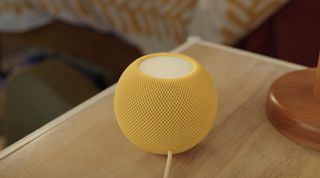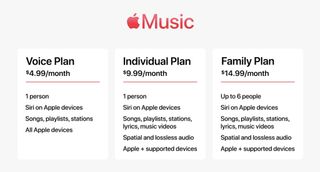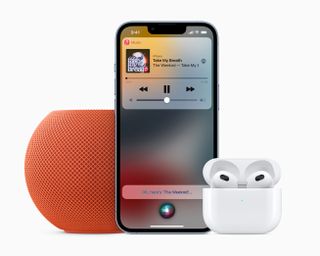

The introduction of an Apple Music Voice Plan took most Apple watchers by surprise at its October 'Unleashed' event. While we anticipated a music-focused announcement in the form of new AirPods, a new Apple Music subscription tier was not rumored.
Though it was quickly overshadowed by the 2021 MacBook Pro, Apple Music's Voice Plan is an intriguing proposition. It certainly got me wondering its purpose and how successful it might be.
Cut-price streaming

Apple isn't the first to provide a reduced-price streaming service with limits. Pandora has offered a free radio service for years, Spotify has an ad-supported tier, and Amazon has its single-device plan.
The last one in that list is probably the closest comparator to what Apple is offering with its Voice Plan, and it was undoubtedly the first thing that came to my mind during the Apple event. For $4 per month, it gives subscribers total access to the Amazon Music Unlimited library of over 75 million songs on one Echo or Fire TV device.
It's similar to Apple's Voice Plan in that it is a cut-price music subscription offering that, for most users, operates as a voice-first streaming service for playing songs, albums, and playlists on-demand. Where Amazon's service is limited to one device, the extra dollar Apple charges allows you to stream across all of your Apple gear, but you can only interact with it via Siri.
The main difference is the positioning of the respective services within Amazon and Apple's contrasting hardware and service landscapes.
For Amazon, its single-device plan is an excellent additional source of recurring revenue for those that take it up. Amazon often sells its Echo devices super cheaply, probably at a loss, or you can pick them up as freebies in various deals, bundled with everything from subscription services to security cameras.
Master your iPhone in minutes
iMore offers spot-on advice and guidance from our team of experts, with decades of Apple device experience to lean on. Learn more with iMore!
Amazon gives these things away in the hope that you'll eventually use them to give it some money by using the Echo to shop on Amazon or via a cheap monthly subscription for Amazon Music Unlimited. In doing so, it recoups the cost of the Echo hardware via other profitable areas of its business.
If the majority of HomePod owners already use Apple Music, who is the Voice Plan for?
It's a different situation for Apple and its HomePod line. Though its services revenue continues to grow, Apple still makes the bulk of its money on hardware. It could sell its HomePod mini for half the price to better compete with Amazon's Echo devices. Still, the company's priority is to maintain a decent profit margin on its products.
As a result of the higher HomePod price of entry, the people buying them are less likely to pick them up on a whim and are more likely to be someone already invested in Apple's ecosystem.
I'd wager that the vast majority of people who buy HomePods already have an Apple Music subscription and don't want to use them solely as HomeKit devices. For a long time (and even to the day for many people), music was the product's main purpose. So, why offer a Siri-only version of Apple Music when Siri device owners already pay for it?
Why does the Apple Music Voice plan exist?
It's not a nostalgia-driven return to the days of the iPod shuffle serendipitously selecting songs for you, despite what that linked post suggests. Ultimately, the Apple Music Voice Plan exists because people are cheap.
The sort of person that would be put off trying Apple Music because of the $10 per month price tag, or the people that put up with annoying ads on Spotify's free plan, are more likely to try Apple Music when the per month price is just $5.
Importantly, there's a non-commitment week-long trial, too. It doesn't auto-renew like Amazon's single-device plan or Apple's own 30-day Apple Music trial. This is a huge deal for tentative users who don't want to end up accidentally paying for a service because they forgot to cancel and shy away from trying new things for exactly that reason.
Plenty of people will try the trial and not subscribe, of course. However, at worst, Apple ends up getting $5 per month from more people that otherwise would not have given Apple Music a second look, increasing its active subscriber count.
Apple could increase both services and hardware revenue with the Apple Music Voice Plan.
Apple is continually looking to grow its services revenue, so Apple will hope that a portion of those $5 per month subscribers turn into $10 per month subscribers. A subset of those may even go on to try Apple's other services in the Apple One bundle, and I'm sure Apple will make the upgrade path as smooth as possible.
But there's another way this plays out to Apple's benefit that contrasts to Amazon's approach. A significant potential upside presented by the Apple Music Voice Plan is in hardware. If an Apple Music Voice Plan user enjoys the experience, Apple hopes that they are more likely to consider purchasing a HomePod or a set of AirPods when they might not have done so before.
Apple's hardware margins are much larger than those on its services. Charging $5 per month for Apple Music, even without Spatial Audio and Lossless quality leaves little room for Apple to turn a profit. But when you factor in potential hardware attachment, that profit margin is considerably higher.
A rising tide

For any of those best-case scenarios to play out, Siri has to offer a great experience. If those trying out Apple Music's Voice Plan have a bad time, they are not going to subscribe after the trial period, and they certainly won't go on to purchase a Siri-enabled device like the HomePod.
Apple has paid Siri some significant attention recently. In iOS 15, Siri gained on-device speech processing for faster response times, offline support for certain requests, along with several other usability improvements and added features.
Apple announced new music-focused updates coming to Siri that will help with the Voice Plan experience, too. These include the ability to start your Voice Plan trial just by asking and a selection of new mood and activity playlists to make it easy for Siri to find the right music for your needs. There will also be a dedicated section called "Just Ask Siri" within the Apple Music app, where Voice Plan subscribers can learn everything they can do with it.
With an added emphasis on Siri, the Voice Plan is good news for current Apple device owners as the digital assistant is going to have to remain a high priority if Apple wants the Voice Plan to succeed.
Adam Oram is a Senior Writer at iMore. He studied Media at Newcastle University and has been writing about technology since 2013. He previously worked as an Apple Genius and as a Deals Editor at Thrifter. His spare time is spent watching football (both kinds), playing Pokémon games, and eating vegan food. Follow him on Twitter at @adamoram.
Most Popular



